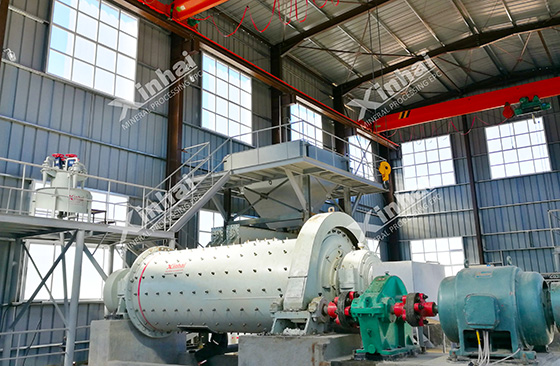

The rod mill is a kind of grinding mill used in concentrator production. Its working principle is that the asynchronous motor drives the reducer or synchronous motor to drive the pinion directly. The pinion meshed with the large tooth ring fixed on the barrel body to drive the barrel body for rotary motion. In this process, the failure of the pinion and bearing of the rod mill is the main factors causing the equipment shutdown and the consumption of spare parts.
The production practice has proved that reducing the failure of the pinion and bearing of the rod mill plays an important role in ensuring the continuous operation of the system and reducing the cost pressure. Here are the main causes of pinion failure and bearing failure, and their corresponding solutions.
During the installation, some errors exist in the flatness and parallelism among the rod mill barrel, motor, reduction gear and pinion base. When the rod mill runs, the vibration of the transmission system causes pinion and bearing to be subjected to impact load, accelerates wear, and even causes the pinion base to crack.
Solution:
Due to position and shape errors during the installation, the relative position changes should be measured periodically. Especially when the foundation is sinking in a small amount, a gasket should be installed on the base to eliminate the impact of foundation subsidence by adjusting the thickness of the gasket; When the amount of foundation subsidence exceeds the standard, the foundation should be rebuilt.
During the operation of the rod mill, the anchor bolts of the motor, reducer or pinion bearing become loose under the action of the inertia force of the barrel, thus resulting in the displacement of the transmission parts and producing the vibration.
Solution:
Timely check the anchor bolts on the pinion base and the motor. If loose, tighten it in a timely manner. If it becomes serious, stop the rod mill and correct the drive system of the rod mill again.
The pinion is the driving gear, the upper tooth surface is easy to wear in the operation process, and the tooth profile is thinner, the clearance of the tooth side is increased, which is easy to produce impact vibration, aggravate the wear of tooth surface. After a period of operation, the roller of cylindrical roller bearing installed on the pinion shaft will wear out, the axial and radial clearance between the bearing and the pinion shaft will increase, and the pinion shaft will appear radial run-out, which will cause the tooth tip clearance of the gear pair to change constantly, produce impact vibration and noise, and intensify the tooth surface wear.
Solution:
Check the working condition of gear pair and bearing regularly. Once the gear produces the abnormal sound, the rotation is unstable, or the bearing temperature is abnormal, the operator must carefully check it and look for the cause.
When the gap between the tip of the pinion and the root of the large ring is large, the center distance of the pinion pair should be adjusted again. When the tooth surface of pinion along the direction of rotation wears seriously, the face should be replaced in time, so that the other side for the main force surface. When the gear appears broken teeth, the gear should be replaced immediately.
When the bearing axial clearance is large, the pinion shaft should be repaired; When the axial clearance, radial clearance cannot be adjusted, or the roller pitting, rotation is not flexible, it should be replaced immediately.
The leaked slurry mixes with the lubricating oil and scales, then produce the foreign bodies. Although a sand control ring is installed outside the large tooth ring to prevent the mortar from entering the tooth surface, its sealing performance is poor. The cylinder liner of the rod mill is fixed by bolts, and the lining-plate bolt near the big gear ring lose gradually after a period of time, if it is not fastened timely, the slurry will be thrown through the lining-plate bolt, and then enters the gearing face between the main gear and small gear, which can destroy the lubricating oil film on the surface of the gear, make the dry milling phenomenon, thus leading to gear surface contact with each other and directly affecting the normal meshing of gear. Sometimes, the mortar and lubricating grease congeal at the root of the teeth, which causes the gear mesh incorrectly.
Solution:
When there is a foreign body in the gear pair, the operator should clean the foreign body first, and check the fastening of the lining plate, the carry out the lubrication of the gear pair.
If the fixing bolt is loose, please tighten it in time; If the fixed bolts slip or wear seriously, please replace it immediately. Besides, timely replace the rubber gasket, regularly clean the pulp and grease of the tooth root, and clean the meshing surface of the gears.
According to the fault location and causes of rod mill, we can start from the installation, adjustment and daily maintenance, formulate and implement the solution measures, reduce the failure rate of pinion and bearing of rod mill from the source, alleviate the cost pressure, so as to achieve the continuous, stable and balanced production of the rod mill.
Through the long period operation, ball mill meets the problem of grinding efficiency descending. It impacts the normal operation of processing plant, and also causes economic losses. In actual production, how can we effectively increase ball mill grinding efficiency? Seven tips will help you.
The gold ore has a high mining value, the gold processing technologies are more complex, and the gold processing equipment used is not the same.
